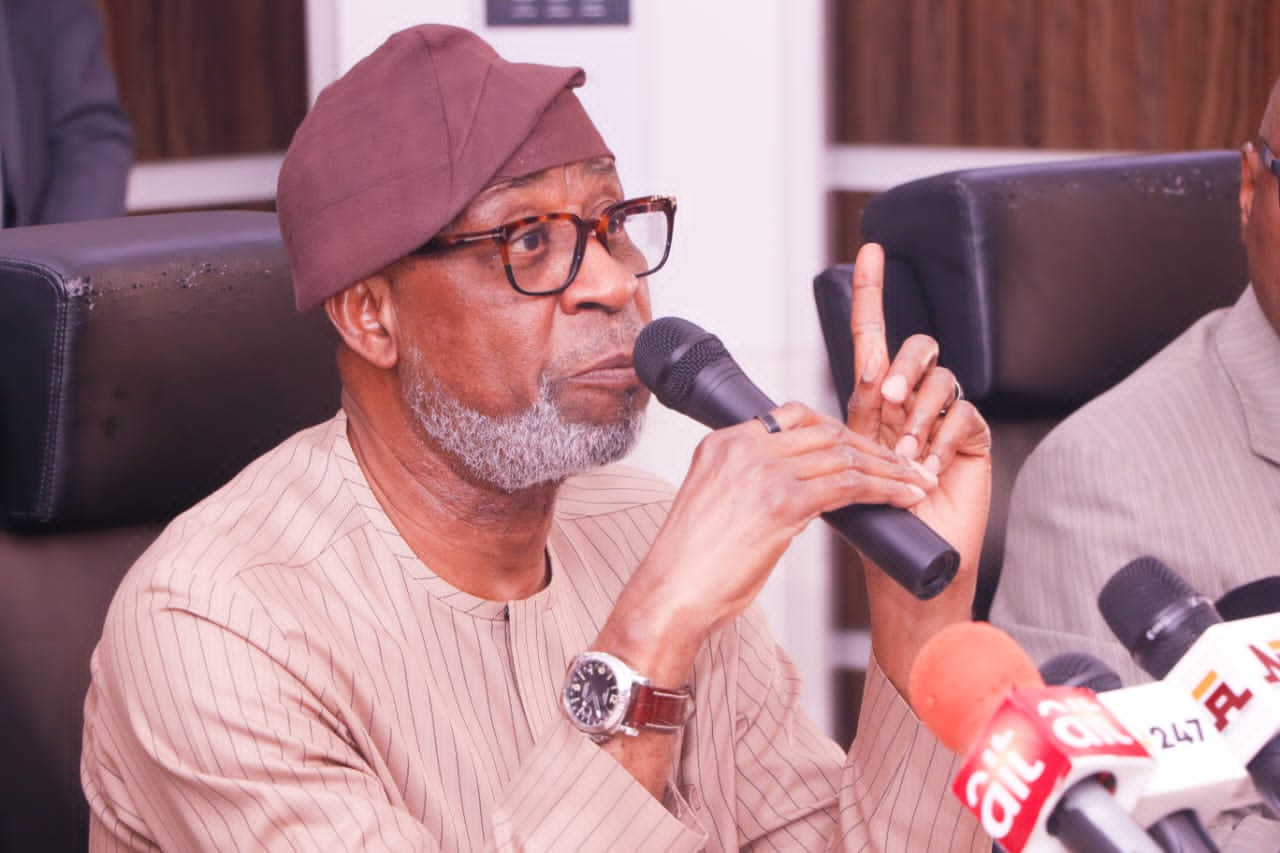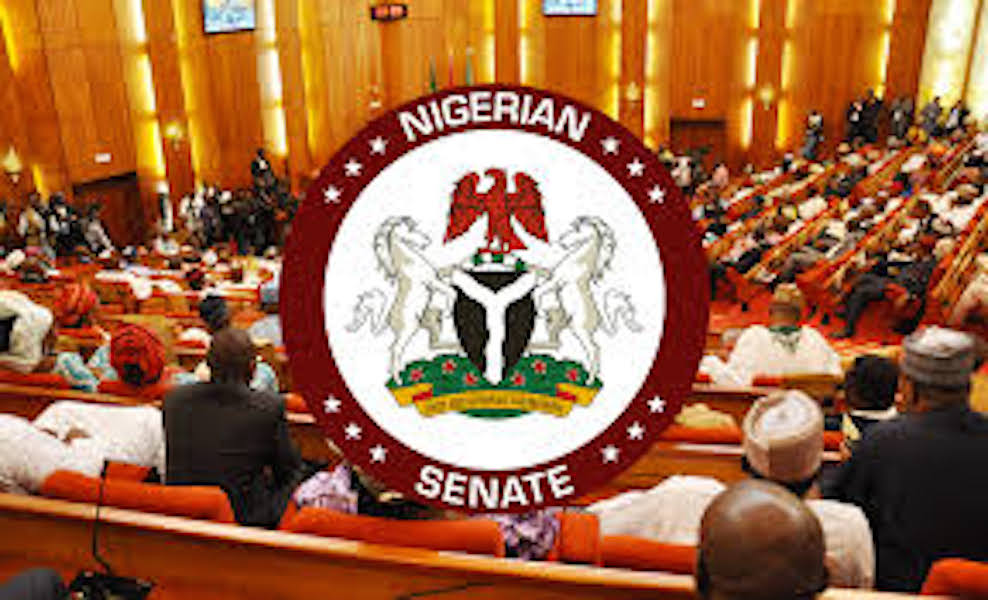News
SERAP drags Akpabio to court over budget padding

SERAP drags Akpabio to court over budget padding
Socio-Economic Rights and Accountability Project (SERAP) has filed a lawsuit against the Senate President, Mr Godswill Akpabio over “the failure to refer the alleged N3.7 trillion budget padding to appropriate anti-corruption agencies for investigation and prosecution, and to recall Senator Abdul Ningi who blew the whistle on the allegations.”
Mr Akpabio is sued for himself and on behalf of all members of Nigeria’s Senate.
It would be recalled that whistleblower Ningi last month was suspended for three months over his allegations that the 2024 budget was padded by over N3 trillion and that the country is operating two budgets.
In the suit number FHC/ABJ/CS/452/2024 filed last Friday at the Federal High Court, Abuja, SERAP is seeking: “an order of mandamus to direct and compel Mr Akpabio to refer the alleged N3.7 trillion budget padding to appropriate anti-corruption agencies for investigation and prosecution of suspected perpetrators.”
SERAP is also seeking: “an order of mandamus to direct and compel Mr Akpabio to immediately take steps to ensure the reinstatement of whistleblower Abdul Ningi who was suspended from the Senate over his allegations that the lawmakers padded the 2024 budget by irregularly inserting projects worth N3.7 trillion.”
SERAP is also seeking: “an order of mandamus to direct and compel Mr Akpabio to put in place transparency and accountability mechanisms to ensure that the trillions of Naira budgeted for constituency projects are not embezzled, misappropriated or diverted into private pockets.”
READ ALSO:
- Impressive win sends Gunners top of Premier League
- Lagos-Calabar coastal highway: Govt gives Landmark Beach Resort seven-day quit notice
- Family demands justice as Navy personnel beat civilian staff to death
In the suit, SERAP is arguing that: “Granting this application would serve the public interest, encourage whistleblowers to speak up, improve public services, and ensure transparency and accountability in the management of public resources.”
SERAP is arguing that, “Directing Mr Akpabio to refer these allegations to appropriate anticorruption agencies and to reinstate whistleblower Abdul Ningi would be entirely consistent and compatible with the letter and spirit of the Nigerian Constitution 1999 [as amended] and the country’s international obligations.”
SERAP is also arguing that, “The allegations by Senator Ningi amount to public interest disclosures and can contribute to strengthening transparency and democratic accountability in the Senate in particular and the country as a whole.”
According to SERAP, “Suspension of Senator Ningi by the Senate followed a seriously flawed process and it amounts to retaliation.”
SERAP is also arguing that, “Senator Ningi’s status as a whistleblower is not diminished even if the perceived threat to the public interest has not materialised, since he would seem to have reasonable grounds to believe in the accuracy of the allegations of budget padding and corruption in the Senate.”
The suit filed on behalf of SERAP by its lawyers, Kolawole Oluwadare and Mrs Adelanke Aremo, read in part: “It is in the public interest and the interest of justice to grant this application. No whistleblower should ever be penalised simply for making a public interest disclosure.”
“Directing Mr Akpabio to refer the allegations to appropriate anticorruption agencies would help to address the lingering problem of budget padding and corruption in the implementation of constituency projects.”
“Directing Mr Akpabio to refer the allegations to the Independent Corrupt Practices and Other Related Offences Commission (ICPC) and Economic and Financial Crimes Commission (EFCC) would also ensure probity and accountability in the budget process.”
“Investigating and prosecuting the allegations of budget padding and corruption would end the impunity of perpetrators. It would build trust in democratic institutions with the ultimate aim of strengthening the rule of law.”
“Years of allegations of budget padding and corruption in the implementation of constituency projects have contributed to widespread poverty, underdevelopment and lack of access to public goods and services.”
“Allegations of budget padding and corruption in the implementation of constituency projects have also continued to have negative impacts on the fundamental interests of the citizens in several communities and the public interest.”
READ ALSO:
- Impeachment: Ugbomhe tipped to replace embattled Edo deputy gov, Shaibu
- 16 aspirants for Ondo APC gov primary, screening holds April 11, 12
- Abia dep Vice Chancellor’s kidnapper nabbed at Lagos airport
“Combating budget padding would improve access of Nigerians to basic public goods and services, and enhance the ability of ministries, departments and agencies to effectively and efficiently discharge their constitutional and statutory responsibilities.”
“Section 15(5) of the Nigerian Constitution requires public institutions to abolish all corrupt practices and abuse of power.”
“Section 16(2) of the Nigerian Constitution further provides that, ‘the material resources of the nation are harnessed and distributed as best as possible to serve the common good.’”
“Section 13 of the Nigerian Constitution imposes clear responsibility on the National Assembly including the Senate to conform to, observe and apply the provisions of Chapter 2 of the constitution.”
“Section 81 of the Nigerian Constitution and sections 13 and 18 of the Fiscal Responsibility Act constrain the ability of the National Assembly to unilaterally insert its own allocations in the budget without following the due process of law.”
“Nigeria has made legally binding commitments under the UN Convention against Corruption to ensure accountability in the management of public resources.”
“Articles 5 and 9 of the UN Convention against Corruption also impose legal obligations on the National Assembly including the Senate to ensure proper management of public affairs and public funds.”
“Article 33 of the Convention requires government institutions including the Senate to ensure the protection of whistleblowers against any unjustified treatment. Granting this application would ensure that these commitments are fully upheld and respected.”
“Senator Ningi is a whistleblower, who is protected under article 33 of the UN Convention against Corruption to which Nigeria is a state party. Senator Ningi is a whistleblower because of his public interest disclosures on alleged budget padding and corruption in the Senate in the context of carrying out his work as Senator.”
“According to our information, Senator Abdul Ningi, the former Chairperson of the Northern Senators Forum (NSF), recently told BBC Hausa that the lawmakers sought the service of a private auditor and discovered irregularities in the budget.”
“Senator Ningi reportedly said, ‘For example, we had a budget of N28 trillion but after our thorough checks, we found out that it was a budget of N25 trillion. How and where did we get the additional N3 trillion from, what are we spending it for?.’”
“According to BudgIT, a total of 7,447 projects culminating in N2.24tn were indiscriminately inserted in the 2024 budget by the National Assembly. 281 projects worth N491bn, and 3,706 projects within the range of N100–500m, worth 759bn were inserted in the budget.”
No date has been fixed for the hearing of the suit.
SERAP drags Akpabio to court over budget padding
Sun
News
Nigeria’s solid minerals worth over $750bn — Minister

Nigeria’s solid minerals worth over $750bn — Minister
The Minister of Solid Minerals Development, Dele Alake, revealed a preliminary report by German firm GeoScan that estimates Nigeria’s solid minerals are worth $750 billion. He highlighted this during a summit organized by the National Institute for Policy and Strategic Studies (NIPSS) and Bruit Costaud, emphasizing the sector’s potential contribution to Nigeria’s goal of achieving a trillion-dollar economy.
Alake noted President Bola Ahmed Tinubu’s commitment to reforms in the mining sector to prevent Nigeria from merely being a mining pit for solid minerals. He stressed the importance of data availability to attract investors and stimulate job creation and economic growth through mineral processing plants.
“We are working with the World Bank, Excalibur and GeoScan, a German company, to get the necessary data on the sector. That is why the federal government signed a memorandum of understanding with Geoscan, and they did a preliminary survey of our minerals’ output and potential. They gave us a figure of $750bn worth of minerals embedded under the ground of Nigeria.”
READ ALSO:
- Lagos cleric, 45, docked for raping 22-year-old lady
- Senate begins moves to harmonise NIN, BVN, other identity platforms
- Pregnant woman among nine people injured in Lagos gas explosion
Collaborations with organizations like the World Bank, Excalibur, and GeoScan aim to gather essential data for the sector. The memorandum of understanding signed with GeoScan resulted in a preliminary survey revealing the substantial value of Nigeria’s mineral resources.
Nasarawa State Governor Abdullahi Sule highlighted the importance of investing in solid minerals, particularly citing the significance of lithium, which he likened to gold. He announced the impending commissioning of Nigeria’s largest lithium processing factory, expected to process 4,000 metric tons daily and transport over a million tons of lithium annually.
Ayo Omotaya, Director General of NIPSS, reiterated the summit’s purpose of charting a path forward for the mining sector, underscoring the necessity of strategic planning and collaboration to harness Nigeria’s mineral wealth.
Nigeria’s solid minerals worth over $750bn — Minister
News
Senate begins moves to harmonise NIN, BVN, other identity platforms

Senate begins moves to harmonise NIN, BVN, other identity platforms
The Senate advocates for integrating the National Identification Number (NIN), Bank Verification Number (BVN), and other digital identity platforms into a unified system. Salisu Shuiab, Chairman of the Senate Committee on ICT, Cyber Crimes, highlighted this during a discussion with the Federal University of Agriculture, Abeokuta.
Shuiab emphasized that a single identity system is crucial for national security and anti-corruption efforts. He criticized the fragmented approach, citing it as wasteful and detrimental to security measures.
He said a unified digital identity system would also help the Federal government plan its various intervention programmes through equitable distribution of resources.
“I can assure Nigerians that the era where you have silos, one individual being a dimension in different places, is not only a waste, it also contributes to insecurity and indeed even corruption.
READ ALSO:
- Pregnant woman among nine people injured in Lagos gas explosion
- UCL: Vinicius scores double as Real Madrid hold Bayern Munich in semi-final showdown
- Binance founder bags jail term in US
“We are making a move to harmonise our identity database. We have engaged the relevant ministries—the Ministry of Communication Digital Economy, the Ministry of Industry, and even the CEO of the National Identity Management Commission—to ensure that a Nigerian who has registered with NIMC and has a national identity number is recognised across all platforms, whether for passport purposes, driver’s license, or the various interventions that the federal government is making.
“You cannot have a digital economy without a reliable digital identity, and digital identity starts with harmonising our database to ensure that one individual is recognised across all the systems,” Shuiab said.
He called for a partnership between FUNAAB and his office on training rural farmers in agricultural production.
In his remarks, the Vice Chancellor of the FUNAAB, Prof. Olusola Kehinde, said he would be willing to partner with relevant agencies to ensure food security in the country.
Senate begins moves to harmonise NIN, BVN, other identity platforms
News
FG approves salary increase for civil servants

FG approves salary increase for civil servants
The Federal Government has approved a salary increase of between 25 and 35 per cent for civil servants.
This move is coming on the eve of the 2024 Workers’ Day.
This was revealed in a statement on Tuesday by the Head of Press at the National Salaries, Incomes and Wages Commission (NSIWC)Emmanuel Njoku.
The increment, it stated, would take effect from January 1, 2024.
The Salary Structure includes the Consolidated Public Service Salary Structure (CONPSS), Consolidated Research and Allied Institutions Salary Structure (CONRAISS), Consolidated Police Salary Structure (CONPOSS), Consolidated Para-military Salary Structure (CONPASS), Consolidated Intelligence Community Salary Structure (CONICCS) and Consolidated Armed Forces Salary Structure (CONAFSS).
Those in the tertiary education and health sectors had already received their increases which involved Consolidated University Academic Salary Structure (CONUASS) and Consolidated Tertiary Institutions Salary Structure (CONTISS) for universities.
For polytechnics and colleges of education, the statement indicated that the new salary structure involved the Consolidated Polytechnics and Colleges of Education Academic Staff Salary Structure (CONPCASS) and Consolidated Tertiary Educational Institutions Salary Structure (CONTEDISS).
Those in the Health Sector will also be benefiting through the Consolidated Medical Salary Structure (CONMESS) and Consolidated Health Sector Salary Structure (CONHESS).
Also, the Federal Government has approved increase in pension of between 20 and 28 per cent for pensioners on the defined benefits scheme concerning the above-mentioned six consolidated salary structures.
-

 International3 days ago
International3 days agoGaza: Hamas studies new Israeli truce proposal, 32 more killed
-

 Education2 days ago
Education2 days agoBREAKING: JAMB releases 2024 UTME results
-

 metro9 hours ago
metro9 hours agoLabour Day: Nigerian workers are dedicated, resilient, says NURTW leader
-

 Business3 days ago
Business3 days agoNaira rebounds, sells for 1,280/$ at parallel market
-

 News2 days ago
News2 days agoTerrorist negotiator Tukur Mamu seeks transfer out of DSS custody to Kuje prison
-

 News3 days ago
News3 days agoI will not govern Rivers on my knees – Gov Fubara sends warning to political detractors
-

 Business2 days ago
Business2 days agoForex: EFCC can freeze 1,146 individual, company bank accounts, court rules
-

 Business2 days ago
Business2 days agoFuel scarcity: Marketers accuse NNPC of denying them products


















